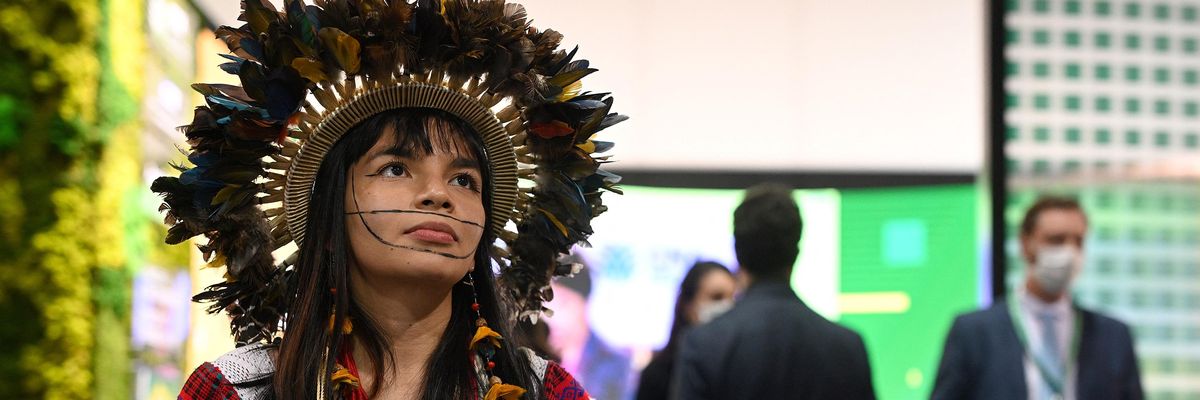As the United Nations Climate Change Conference--also known as COP26--got underway in Glasgow, Scotland this week, Indigenous activists from around the world warned that failure to center their peoples' voices and solutions would seriously hamper efforts to tackle the growing planetary emergency.
"We can develop actions based on our culture and our traditional knowledge."
"Today, the climate is warming, the animals are disappearing, the rivers are dying and our plants don't flower like they did before," Txai Surui, a law student, activist, and member of the Paiter Surui people of northwestern Brazil, said during Sunday's COP26 opening ceremony. "The Earth is speaking. She tells us that we have no more time."
"Indigenous people are in the frontline of the climate emergency, and we must be at the center of the decisions happening here," she stressed. "We have ideas to postpone the end of the world."
However, Rebecca Sinclair, a member of the Cree from Barren Lands First Nation in Manitoba, Canada and a research and policy analyst at Indigenous Climate Action (ICA), lamented that "we're being excluded from the conversation."
"I think people at a global stage need to hear that we, regardless of who's making policy or what's going on, Indigenous folks, knowledge keepers, elders are still caring for this land and we can only benefit from that," she told CBC News, adding that ICA's COP26 delegates will be "trying to influence as much policy as we can to uplift Indigenous voices and sovereignty and our rights."
"What the global stage needs to understand is that you're repackaging solutions that we have and excluding us from that conversation, which can be detrimental to the climate crisis already," Sinclair added.
Kyle Whyte, a member of the Citizen Potawatomi Nation in Oklahoma who serves on U.S. President Joe Biden's White House Environmental Justice Advisory Council, toldNBC News that "if countries don't get on board with us, leaving out the people who steward a lot of the lands, it's not just a moral issue anymore. It will have a devastating effect on the speed at which the rest of the world will get to sustainability."
Mina Setra, deputy secretary-general of the Indigenous Peoples Alliance of the Archipelago (AMAN) in Indonesia, toldMongabay that "no [climate] initiative can succeed if rights are not recognized."
"We can develop actions based on our culture and our traditional knowledge," Setra said, adding that with official recognition of Indigenous land and forest tenure, "we can do even more because communities will be able to scale up their actions."
Sonia Guajajara, head of the Articulation of Indigenous Peoples of Brazil (ABIP), toldReuters that "if there is no protection of Indigenous territories and rights, there will also be no solution to the climate crisis, because we are part of that solution."
Guajajara is part of a 40-strong delegation of Indigenous peoples from Brazil who decried the increasing threats posed by logging and mining, as well as by the administration of right-wing Brazilian President Jair Bolsonaro--a climate change skeptic sometimes called "Captain Chainsaw" for having presided over the destruction of over 10,000 square miles of rainforest during his tenure.
"We need to urgently save our territories to protect the lives of Indigenous people and the future of our planet," she said.
Indigenous activists also warned against false market-based climate "solutions."
"We see that everything is leading up to the carbon market," said Setra. "That really worries us."
Others took issue with what they called the shortsightedness of some nations' climate policies.
Jayce Chiblow, an Anishinaabe from the Garden River First Nation in northern Ontario, Canada and an ICA activist, told CBC News that "the youth have to think of our next seven generations, so bringing that to the table is really important."
"And in my experience," Chiblow added, "I haven't seen colonial governments think that far ahead."
